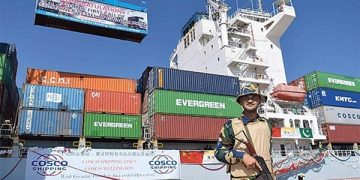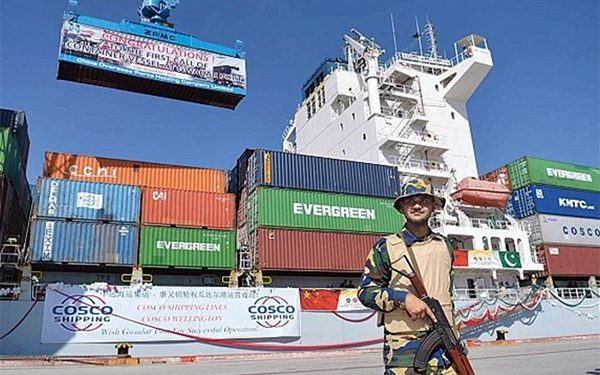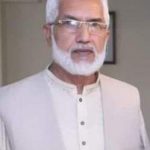Riaz Ahmed Malik
China Pakistan Economic Corridor (CPEC) is inching toward the completion of its phase-I in the country. It has now become icon of socio-economic prosperity and economic sustainability. It has changed the landscape of energy in Pakistan. It has brought revolutionary changes in industrialization drive of the country. Moreover, the CPEC has revolutionized every sector of macro-economy in the country. It has become a magnetic force to gear up the process of massive industrialization and exports in Pakistan.
It has further strengthened the concept of blue economy which is indeed the future of regional connectivity as well as international economy in the days to come.
For the further strengthening of Sino-Pak bilateral relations, realization of CPEC’s strategic utility and scope the federal government of Pakistan performed the groundbreaking of phase two of the Gwadar Free Zone (GFZ) and launched a number of other mega development and infrastructure projects including an expo centre, agriculture industrial park and three factories.
For the further development of Gwadar the federal government announced a number of initiatives to promote human development such as a technical college, a hospital, university, cheap loans for farmers and poor households and a program for uplifting of Gwadar’s fishermen. Thus the role of Gwadar port and facilitation of CPEC is essential for future socio-economic prosperity of Pakistan and especially Balochistan.
Gwadar has been rising with CPEC and many Chinese companies showed great interest to invest in Gwadar including Huang Weiguo (Textile), Huang Daoyuan Henan Dr (Technology), Fang Hongyan CMEC (Agriculture), Shen Jian Xiano (Wool Spinning Technology), David Dia )Bioperfectus Advance Medical Technology), Chen Yi Royal (Dairy Processing), and last but not least, Bao Dequan (Saga Textile).
Most recently many projects of agro-economy and livestock including Gwadar Fertiliser Plant, Gwadar Animal Vaccine Plant, Henan Agricultural Industrial Park, Hengmei Lubricants Plant, Gwadar Free Zone Phase Two, Gwadar Expo Centre have been inaugurated in Balochistan.
It is hoped that these projects would enhance the agro-economy of Balochistan and, of course, Gwadar. During his one-day visit various MOUs were also inked.
However, while visiting to Balochistan, Prime Minister Shehbaz Sharif expressed dissatisfaction over the slow pace of work on development projects in Gwadar, especially the ones which would provide clean water and electricity.
During a high level meeting he directed to strictly follow the timelines in order to avoid any more delays in the projects. The prime minister said while addressing the inauguration ceremony of Eastbay Expressway and groundbreaking of seven more development projects for Gwadar showed serious concerns about the low momentum of CPEC social development projects in Gwadar.
In this connection, hopefully, a component of the China-Pakistan Economic Corridor (CPEC), the six-lane Eastbay Expressway would connect the Gwadar Port with the Makran Coastal Highway, also providing a link to Karachi.
The premier minister also got acquainted with the development projects, including the under-construction Gwadar Airport which was being built under a Chinese grant and faced a delay in completion. The incumbent premier Shehbaz broke ground for the Gwadar Seawater Desalination Plant by China Aid, Jingtal Gwadar Private Limited, Hangmei Lubricant Plant, Hangeng Agricultural Industrial Park, Gwadar Expo Centre and Gwadar Fertiliser Plant, besides distribution of 3,000 solar panels.
Moreover, the premier said the Eastbay Expressway would also provide a link to Karachi to ease the transportation of goods. He shared that a desalination plant would be installed and a hospital has been built for the people of Gwadar, while 3,200 solar panels will be distributed among the families here.”
He said instead of wasting billions of rupees on water reservoirs, a desalination plant should have been installed to cope with the water needs of the people of Gwadar.
He assured that due to silting, the depth of Gwadar sea port was reducing and instructed for the dredging to allow the traffic of heavy ships.
He suggested a G2G model for installation of the desalination plant, calling for initiating talks with the Chinese side without any delay. Proposing a model to address the issue of power supply to Gwadar, he said the government should award a contract to any private company to provide solar panels to the households and bank loans should be arranged for them to pay back.
Proposing a second model, the prime minister said a solar plant of 100-150 megawatts should be installed in Gwadar to provide off-grid power supply to the people. Shehbaz also announced that in the first phase, the federal government would provide 2,000 boat engines to the fishermen through balloting.
Proposing a model to address the issue of power supply to Gwadar, he said the government should award a contract to any private company to provide solar panels to the households and bank loans should be arranged for them to pay back.
Shehbaz also announced that in the first phase, the federal government would provide 2,000 boat engines to the fishermen through balloting.
Chinese Foreign Ministry spokesperson Zhao Lijian said that the Karot hydropower project being completed under China-Pakistan Economic Corridor, will meet electricity needs of around five million local residents, improve Pakistan’s energy structure and boost sustainable development,
Addressing the regular briefing in Beijing on Monday, he said that the Karot hydropower plant on the Jhelum River is a major energy cooperation project between China and Pakistan.
He said that once all units are installed and put into operation, the project will start generation of steady and affordable 720 megawatt energy.
Zhao Lijian said that the hydropower plant is expected to reduce carbon dioxide emissions by around 3.5 million tons per year which would make new contribution to the global response to climate change. We really appreciate facilitations of CPEC for the development and transformation of Gwadar which guarantees the consolidation of the blue economy in the country.
CPEC has introduced new hope of a qualitative life and better future even among the local people in Balochistan.
It is suggested that an ideal combination of public-private model of integrated development should be followed in which local investors have equal rights and privileges to excel.
(The author is Joint Editor of
Daily National Herald Tribune (NHT) Islamabad )





